TECHNICAL REPORT
| Grantee |
SATSOL Ltd
|
| Project Title | OASIS Data Garden Project |
| Amount Awarded | USD 85,000 |
| Dates covered by this report: | 2021-12-14 to 2024-09-01 |
| Report submission date | 2024-10-22 |
| Economies where project was implemented | Solomon Islands |
| Project leader name |
David Leeming
|
| Project Team |
Jason Lamani
|
Project Summary
SATSOL's Data Garden Project developed and piloted an innovative telecommunication solution for rural and remote villages and underserved communities. Whereas urban populations in Solomon Islands have been enjoying abundant bandwidth from the Coral Sea Cable that was launched in 2019, many rural villages remain out of reach of fibre-based connectivity and the population and businesses are not yet able to benefit from the digital economy as much as those living in urban areas.
The new generation of high-throughput satellite services such as Kacific and StarLink create possibilities for alternative solutions for such areas, complementary to the cable. However, there are practical constraints to the accessibility of such services, such as lack of electrical power infrastructure and the difficulty of providing billing and payment options in such remote areas, whilst shaping products and plans that are affordable for people who may have irregular incomes, may not have bank accounts or own credit/debit cards.
Despite the ongoing extension of existing cell tower networks, the challenging terrain of the Solomon Islands and the cost of installing and maintaining such infrastructure means that many village communities have not enjoyed 4G or even 3G coverage for some time to come.
The Data Garden is a solution that addresses some of these challenges by bringing three fundamental components of the digital economy to rural villages, namely fast broadband, a digital payment platform and smart solar electrification. The Data Garden technology integrates high-throughput connectivity with a stand-alone power source; fully automated with a state-of-the-art digital payment system called iumiCash that can be used by local people and businesses, even without the need for a bank account.
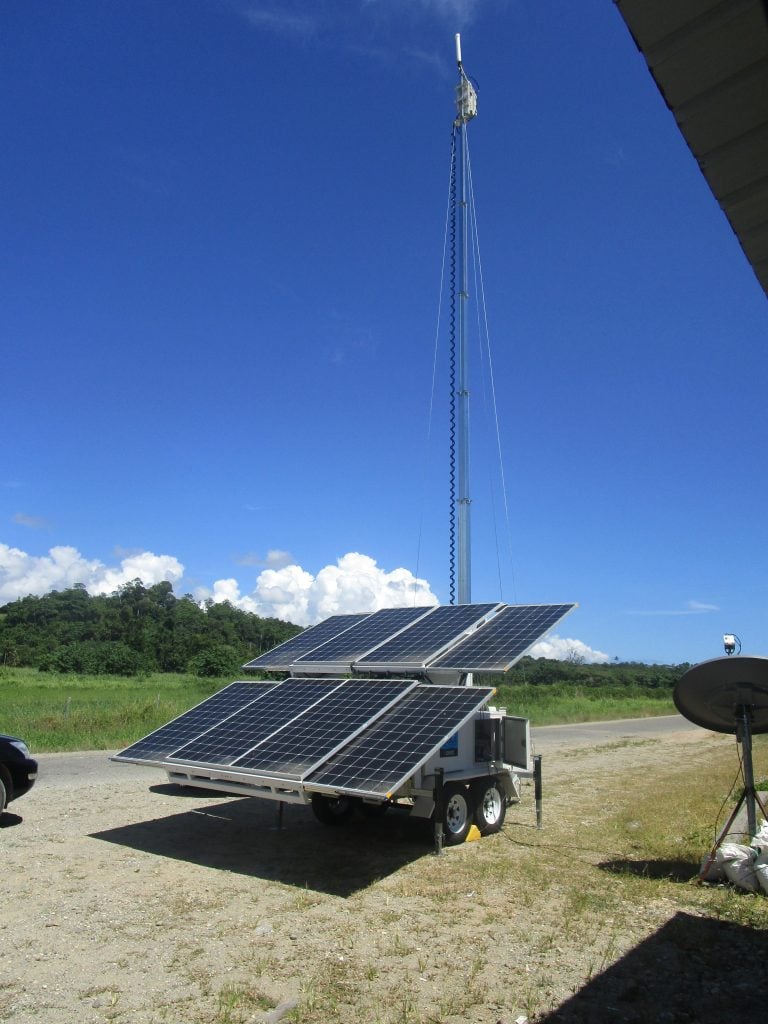
The Data Garden was demonstrated by the project to be easily transported to a typical remote location in the Solomon Islands by towing (and can also be delivered on a landing craft). It has operated autonomously and extremely reliably at the project site for over 18 months and from June 2024 has provided commercial data services to the community. The Data Garden is an ideal solution for remote villages and communities where it can provide for individuals, households, businesses, schools and clinics. It complements traditional cell towers, filling in areas of poor coverage at much lower cost, creating new opportunities for providers whilst stimulating a rural digital economy.
The project has piloted the solution in realistic conditions in partnership with the rural community and their school at Numbu village, north-east Guadalcanal generating data and lessons learned for the sector.
Video by Karl Bouro, Torn Parachute
Table of Contents
- Background and Justification
- Project Implementation Narrative
- Project Activities, Deliverables and Indicators
- Project Review and Assessment
- Diversity and Inclusion
- Project Communication
- Project Sustainability
- Project Management
- Project Recommendations and Use of Findings
- Bibliography
Background and Justification
Until recently, Solomon Islands relied on expensive and relatively slow satellite connectivity for its connection with the outside world. The country’s geography is also very challenging, with the 700,000 population scattered over about 15 large islands and hundreds of small ones over a vast area of the SW Pacific. This has meant that Internet connectivity has been very poor by world standards, with affordable broadband mainly only available in the capital and a few towns.
A milestone arrived in late 2019, when the country was connected to Australia by the Coral Sea 2 undersea cable, thanks to the financial assistance of the Australian Government. This has brought in abundant connectivity via the four cable landing stations. Since then, Internet users in Honiara and a few towns have seen considerable improvements. For the same price as before, they typically receive ten times the data and over faster networks including direct fibre and LTE. For mobile users, the experience means more gigabytes of data for the same price. This trend is continuing and the local ISP industry is responding quickly and also expanding with new entrants, which has a positive impact for the consumer.
Whilst the fibre networks are expanding in the main towns, the fibre connectivity reaches out from the landing stations into the provinces mostly through the mobile networks. Where this coverage is not available, the new generation of high throughput satellites (HTS) such as Kacific and StarLink are complementing the fibre in terms of faster network speeds and cheaper data.
However, in provincial and rural areas it has been difficult to pass on these gains. It is always possible to bring this abundant bandwidth to the rural villages, for instance using VSATs, but it has to be translated into something that is accessible, affordable and meaningful in terms of what people can and want to do with it.
Challenges include lack of electrical power. Outside the main towns there is no power grid and households and businesses must depend on solar power or petrol generators. The economy is quite slow with few jobs in rural areas, and limited cashflow. It is also largely a cash only economy, as many do not have bank accounts, banks and ATMs are only located in a few provincial towns. Most villagers don’t have access to debit/credit cards.
The need remains for local operator to innovate to overcome such barriers and shape available connectivity into accessible products and affordable plans that suit people's circumstances and meet their needs.
Motivation
The motivation for the project stemmed from SATSOL's vision and business model to provide the best services, not only in the urban areas but the rural areas where most Solomon Islanders live. As a local company, and with a history of innovation with satellite Internet services, SATSOL has the most experience of all the ISPs in rural access provision and has a deep understanding of the issues and challenges. SATSOL are already experienced public-private partners with Solomon Islands Government, maintaining all of the government networks in the provinces.
The Data Garden project has been in response to the needs of remote and rural communities. The concept addressed the three related access issues that affect many of rural Solomon Islands communities, namely (i) the lack of affordable connectivity, (ii) absence of grid power and (iii) difficult access to cash and means of making financial transactions.
The need to solve these challenges goes hand in hand with having a sustainable commercial business model. For instance, we cannot expect reliable on-time payment from customers for Internet services if they have difficulty making payment due to lack of access to bank accounts. To scale up to the majority, SATSOL needed to cater for those with limited digital skills, and those who might not be eligible or be able to use online banking and credit/debit cards. Thus, an integrated financial technology (FINTECH) solution was needed. By integrating the iumiCash digital payment system the local economy has also benefited from the flexible low cost means of making cash payments and transfers including gifts and remittances.
Project Implementation Narrative
Approximately 80% of Solomon Islanders live in provincial and rural areas, but they have been slow to benefit from the Coral Sea cable that was launched in late 2019. Due to the mountainous terrain and scattered island geography, traditional cell tower coverage where it does exist can be very uneven.
Compounding this lack of coverage in provincial and rural areas is lack of on-grid power and a reliance on cash payment. Cash is often in short supply in rural areas where there are no banking services. Therefore, people and businesses find it hard to pay for services such as connectivity. Due to the scarcity of jobs in rural areas, many people do not have disposable cash to spend on Internet services given competing demands on their funds. Few people can afford USD 1,000 for a Ka-band terminal, or the newer StarLink terminals and the solar power needed to operate it in off-grid areas.
The Data Garden idea was conceived in 2021 during the covid pandemic when the country was locked down. SATSOL, as a commercial ISP saw the potential of the rural Internet market and wanted to address the challenges through innovation. We realised we could not overcome all the barriers but could draw on our technical expertise, experience and local knowledge and work closely with a suitable rural community to pilot the innovations and test assumptions. Four components were identified:
(1) Some form of satellite backhaul;
(2) A distribution network that provides good coverage and 4G performance);
(3) Smart solar power, and
(4) Financial technology, in this case a mobile money startup called iumiCash had just been launched. The two companies shared a close business relationship and wanted to collaborate. At the time, the covid measures had made digital payment methods a necessity and we realised we could extend its integration into SATSOL's platform to help extend Internet access into rural areas.
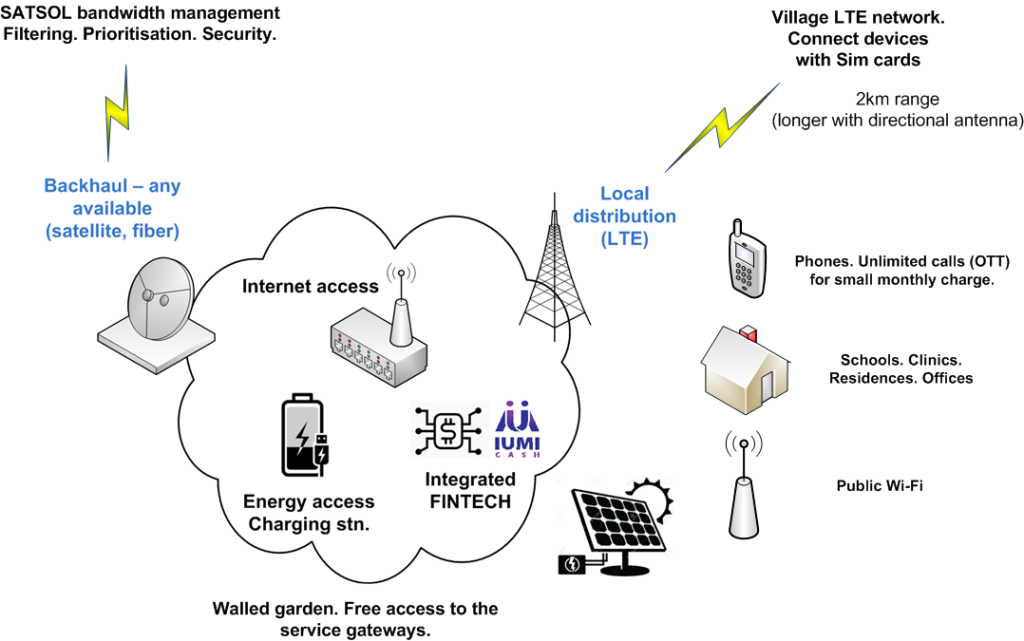
Project launching
SATSOL became aware of the APNIC Foundation and the ISIF Award and successfully applied for a grant, and was delighted to launch the project in early 2022. The first thing to do was seal a partnership with a local community in a rural area where the pilot could be run in a realistic competitive setting. At that time Numbu Community High School (CHS) approached us regarding school Internet and we realised the location was very suitable for the project, being rural but reasonably accessible by road in around 2 hours from Honiara. A mobile phone ownership survey was conducted of 136 households that showed high smartphone ownership and dual SIM phones, the presence of a competitor Telekom but with typical patch coverage, and a large school community. The village was economically active linked with Honiara markets and were enthusiastic about the potential. Community engagement activities took place and in March 2022 a hosting agreement was signed (attached). The agreement established two key institutions:
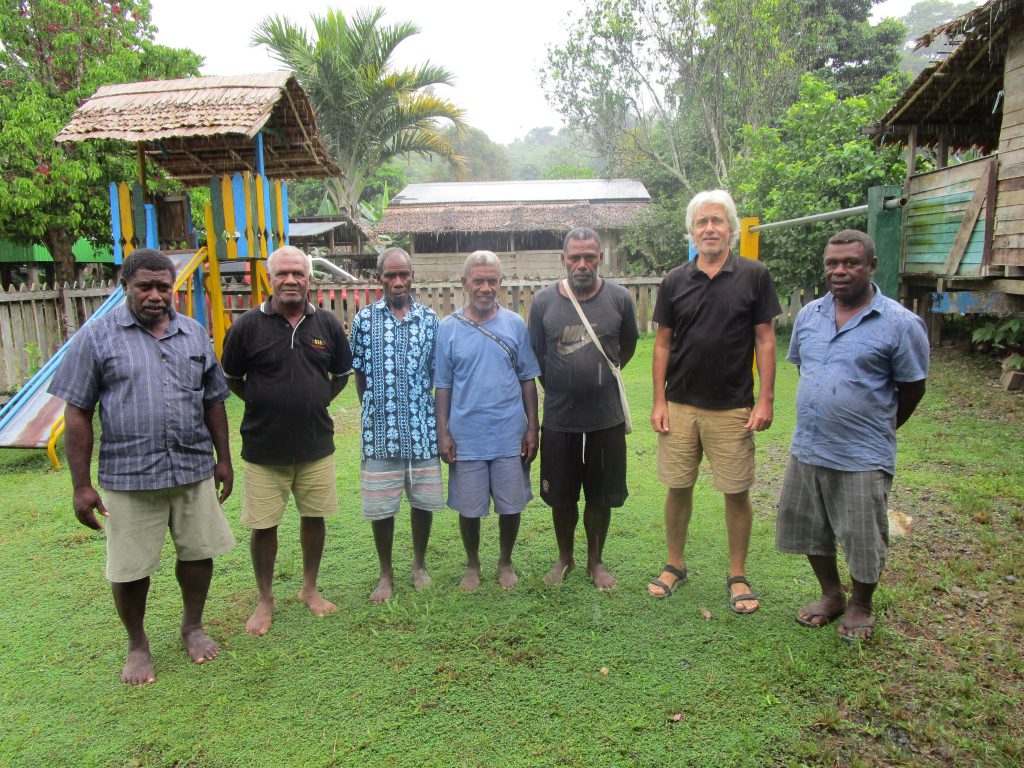
(1) The Community Committee, to ensure the community has ownership and oversight and actively participates in decision making and activities affecting the community, and
(2) A Volunteer group of enthusiastic mainly young people who could conduct technical monitoring, mobile surveys and act as champions to the community in return for free data as incentive.
The procurement of solar trailers from China, equipped with 11m retractable masts proceeded and the development of the technical system components, which included the following:
- LTE system (trailer based radio and gateway, and backend EPC
- Integration with SATSOL's Billing system
- Development of SATSOL top-up facility in the iumiCash app
- Sourcing and trialling of SIM cards (at that stage, as a fixed Internet ISP SATSOL did not have MNO capacity)
Challenges with procurement
In 2022 supply chains were still severely disrupted following the pandemic and we found it impossible to procure a new single LTE radio (the most expensive component of the LTE system). As a result SATSOL decided to allocate one existing radio from stock (SATSOL operates an LTE based fixed WISP business in Honiara using AirSpan equipment). An AirSpan Harmony 4000 was allocated and the original procurement costs charged to the project. Likewise, Commercial branded SIM card development was taking time. In the short term we used standard SIM cards as used in the fixed network to test the trial system.
Deployment and community-based testing
By November 2022, the trial system was ready for road tests. We towed the trailer to a rural location a few kilometres west of Honiara and conducted signal tests establishing connections at up to 1.5km line of sight as expected. The backhaul used as a 1.2m Kacific Ka-band VSAT. Having conducted these tests successfully the deployment was carried out to Numbu in early December 2022. This proved also the "quick-deployment" characteristic. A Toyota Landcruiser was used to tow the trailer 70km over a potholed road and several km of dirt tracks to the steep hill up to the school, and it went very smoothly. The system was active within 2 days and coverage tested over the school and village area out to almost 2km in the main directions.
Photographs of the deployment are included in the attached PowerPoint, and also can be seen in the Project Brochure, designed as part of the project communication activity.
By early 2023, we had a working Data Garden LTE system that could provide free data to anyone with a SATSOL standard (non-commercial) SIM. The 15 volunteers were give SIM cards and a monitoring system agreed, with the SATSOL Project Officer leading a WhatsApp group. Solar power systems, provided as SATSOL's contribution, were installed in the school with free Internet access as part of the hosting agreement. Throughout 2023, the Data Garden remained operational and proved very reliable. There were no outages due to equipment failures, and the backend systems were refined with close monitoring and feedback from the community volunteers.
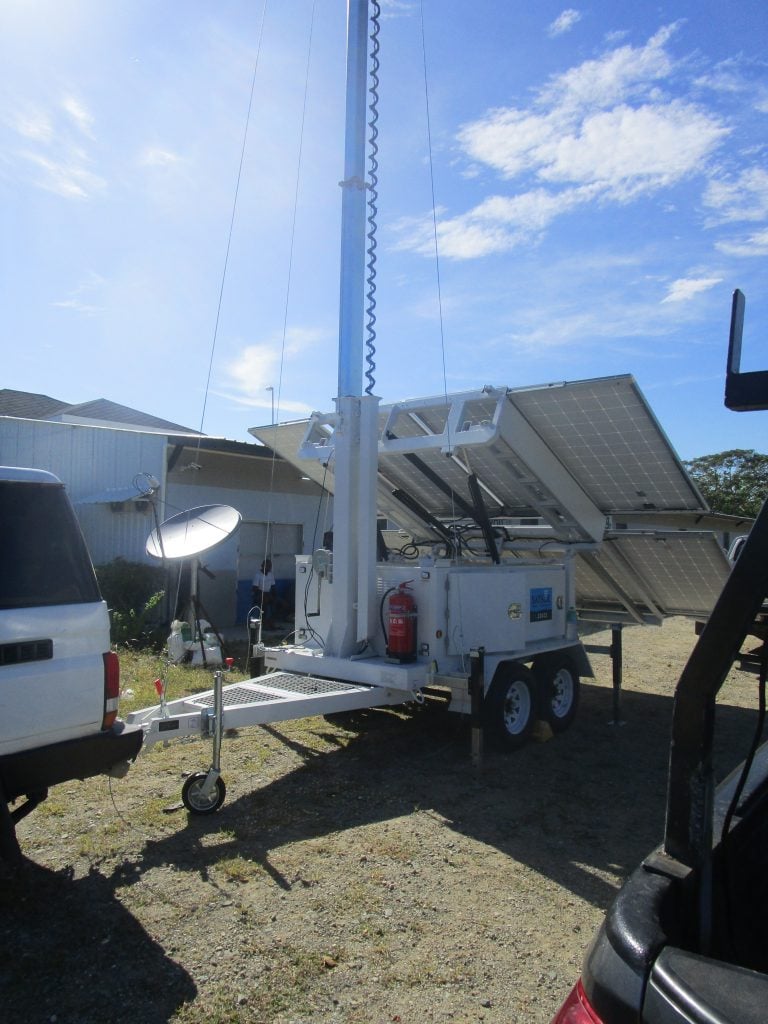
This proved the concept under real-life conditions, with project activities to test, fine tune and prove the concept over a period of time. During 2023 the Data Garden was closely monitored for the technical performance and reliability and the community was kept engaged with at least monthly site visits, two formal committee meetings and capacity building. This included a structured iumiCash training workshop where the school administration and village canteen operators who were identified as iumiCash agents and community members were trained to use the app and engaged in role-playing, with real goods being used to demonstrate using digital money. A report is attached, which includes the results of a survey carried out to find out participants evaluation of iumiCash.
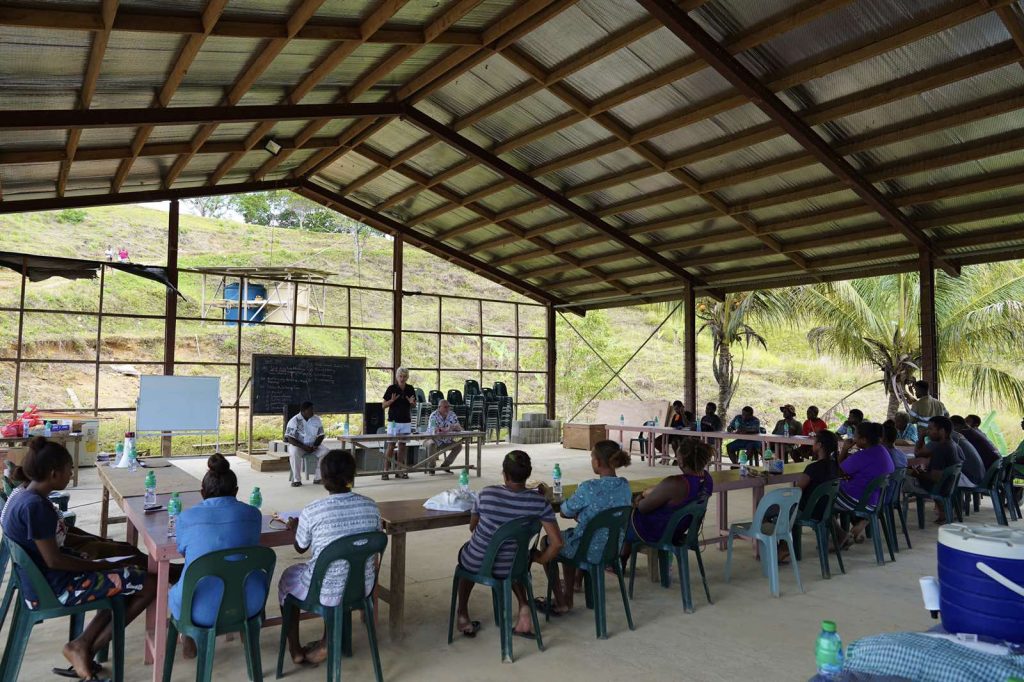
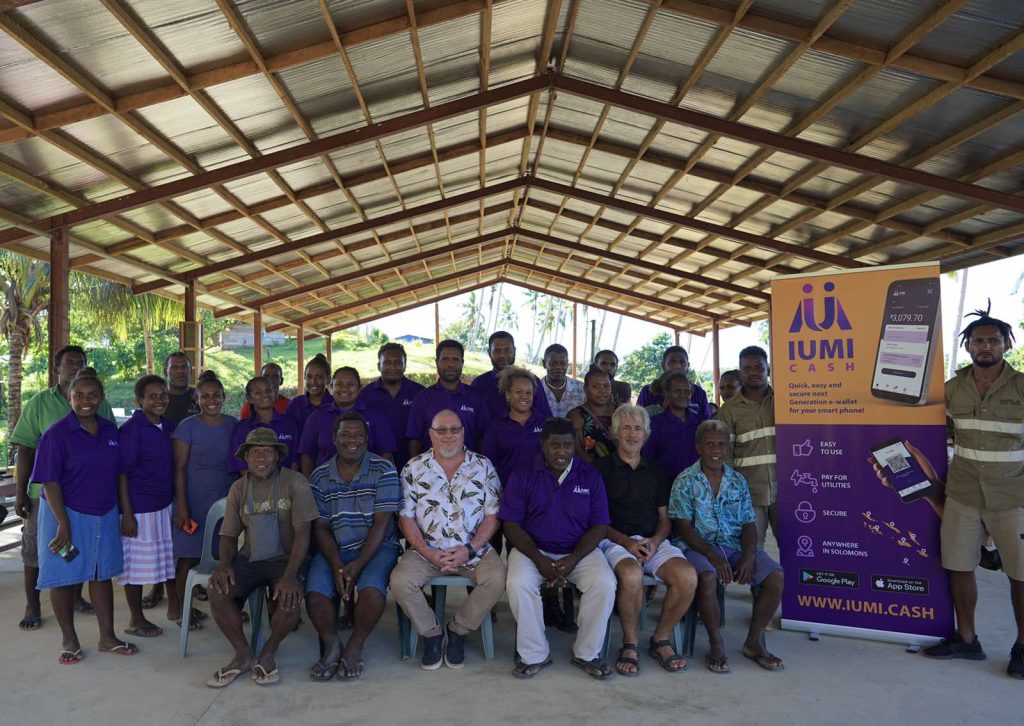
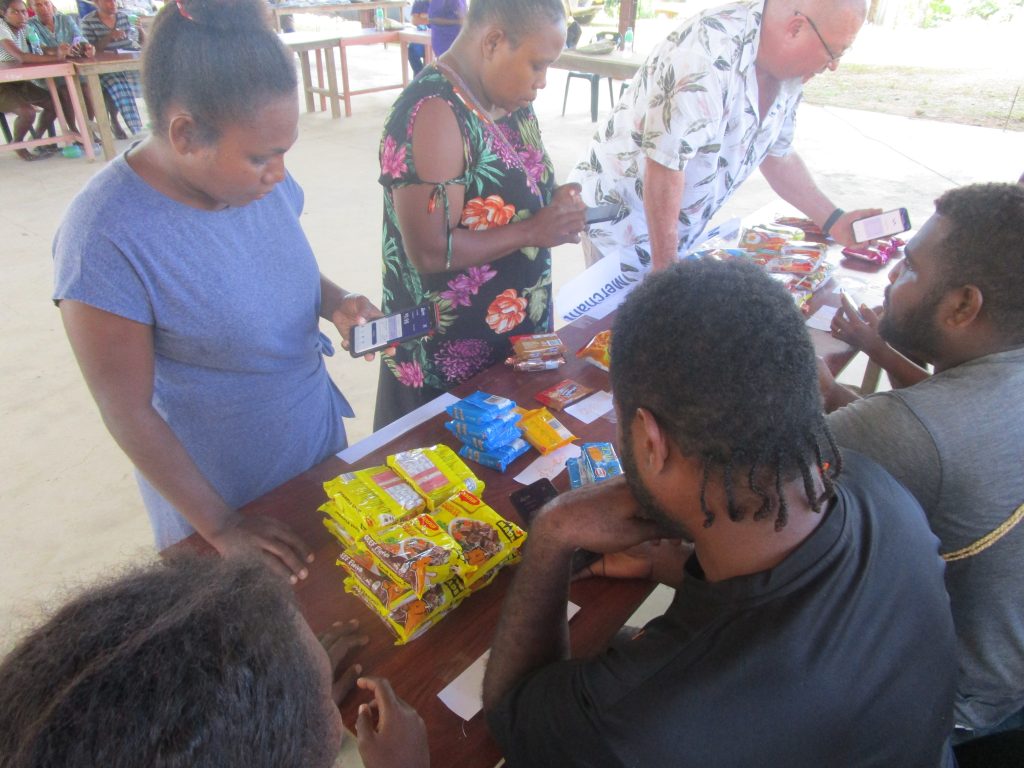
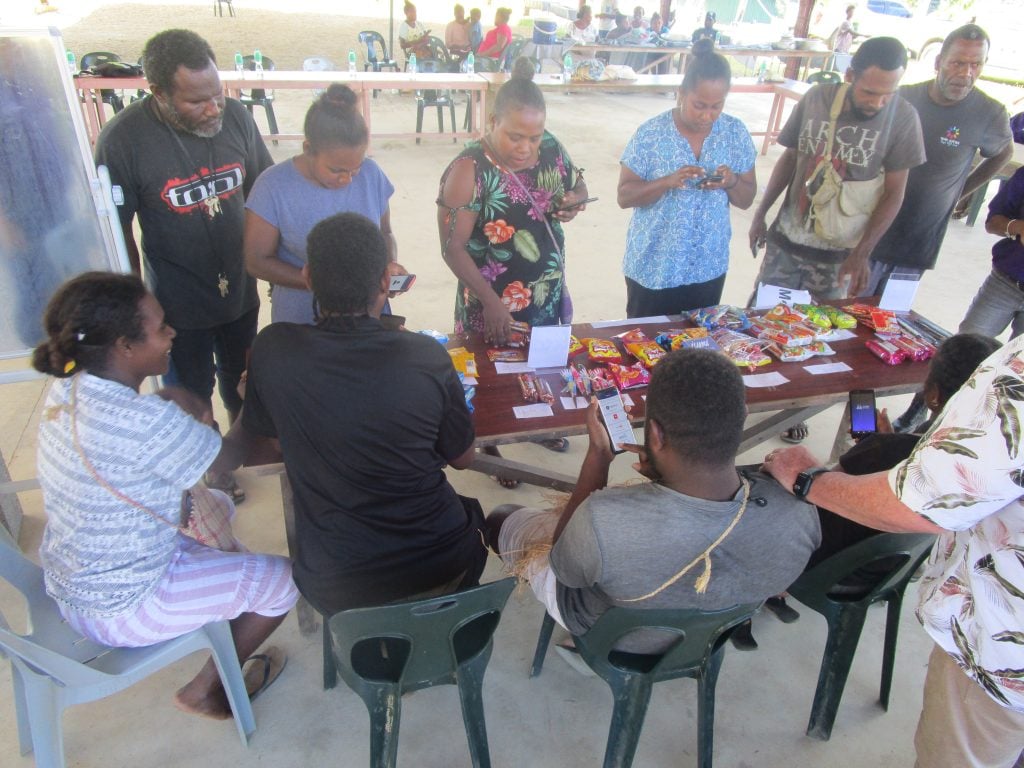
Development of Commercial system
The final technical component took an extended time to complete. This was the development of the commercial SIM cards and Data Garden app which is used for registration and then purchase of the data plans offered by SATSOL. The iumiCash app is used to top up credit in the Data Garden app. A training guide is attached, which illustrates the processes the community (customers) need to follow. We did not anticipate the time required, for instance to satisfy the Google requirements to publish the app on Google Play Store. SATSOL was also highly committed to other projects, especially fibre roll out, essential to our covid-recovery strategy. This component required additional resources well above those charged to the project grant, but they have wider implications for SATSOL's business development towards becoming a full MNO and with the capabilities to scale up the Data Garden concept in a suitable format nation-wide.
Shortly before the Commercial Launch, the backhaul was changed to StarLink. This improved the performance significantly. It is also significant in terms of inclusion, helping more people to enjoy the benefits of StarLink, including those who don't have credit cards or regular incomes. StarLink were officially licensed in Solomon Islands in August 2024, and SATSOL will be an official reseller for corporate and public sector customers. This allows us to use the technology for backhaul in applications such as the Data Garden.
Commercial Launch
Finally in Q2 of 2024 the first batch of 1000 commercial SIM cards specifically configured for the Data Garden were procured, and the Data Garden app was completed and published on Play Store. The final stage of the project then commenced.
With the network fully configured for retail data services, and all the supporting infrastructure in place (Data Garden app, iumiCash top-up facility and agents and SIM card distributors), the commercial pilot was launched in July 2024. A launch workshop was held at Numbu in close collaboration with the community. This consisted of:
- Meeting of the Committee to brief them, provide complementary SIM cards
- Presentation to the community by the SATSOL team and iumiCash team
- Training for community members how to install and register SIM cards, top up with iumiCash and purchase data plans;
- Training and mentoring for the SIM card distributors and iumiCash agent
- Videography and interviews of community and project participants to document the event
An initial 100 SIM cards were distributed at the launch, and a few weeks of monitoring and fine tuning of the network followed with the Volunteers monitoring and supporting the community. The team returned to Numbu in August 2024 and opened up SIM card sales with another 300 cards issued to the distributors.
The commercial launch is captured in two short videos.
Video by Karl Bouro, Torn Parachute
Initial uptake and analysis
As of time of writing, around 100 SIM cards had been registered. SATSOL monitors usage and commercial demand through the Billing system which provides statistics on SIM registration, top ups to mobile numbers made through the iumiCash app, and plans purchased in the app.
A report with the initial usage statistics and a customer survey is attached.
The initial results show that despite the enthusiastic response at the launch and the number of SIM cards sold, significant usage and turnover in terms of people topping up with iumiCash, buying data plans and then replenishing them has been quite slow. The project team (collaborating with the volunteers) conducted a mobile survey of customers to determine level of satisfaction and identify any issues. The following findings were made:
- The survey results and general feedback show conclusively that the community supports and values the Data Garden
- The Data Garden performance and reliability are regarded as much better than other networks available in Numbu
- Customers confirm they intend to use the service
- There are some minor technical barriers that SATSOL needs to address. To access the Data Garden should be simplified and self supporting. For instance, required services (Data Garden app, iumiCash app) need to be made zero rated and accessible even when customers have used all their data.
- People need time to adopt to new ways of doing things. This especially applies to the use of digital money. Although iumiCash and other mobile money such as Telekom's mSelen have now been in circulation for a few years, cash is still predominant. trust needs to be created. Likewise, the village "digital ecosystem" needs to consolidate and show itself to be reliable for people (i.e., iumiCash agents must make themselves available when people need them).
- The project is local, and people cannot use their SIM cards outside the village.
In conclusion, it will take time to build demand and consolidate the Data Garden as the preferred provider for data in the village, and for iumiCash to become a daily medium of exchange in the village. It is too early to point to lasting benefits and outcomes, although the feedback from the community does indicate high expectations of benefits.
VIP Launch
A VIP launch or high-profile ceremony is planned to officially launch the Data Garden service. SATSOL has already promoted the Data Garden with important stakeholders from the government, agencies, the regulator and central bank who have all expressed interest to attend. This event is included in the project activities. However, SATSOL advises that the event would be more timely and meaningful if the demand is allowed to grow and stabilize, and lessons are learned from the surveys and community meetings. The date for the meeting is therefore set back towards the end of the year.
Project Activities, Deliverables and Indicators
Beginning of Project
| Activity | Description | #Months |
|---|---|---|
| Mobilisation | Set up Steering Group Set up project financial account. Project orientation training for SATSOL staff. Procurement of equipment. Procurement of professional services (iumiCash, SuperFly, Platforma). | 2 |
| Engagement | Stakeholder meeting to launch project. Identify host community school for trials in collaboration with stakeholders. Visit community school and sign agreement, awareness for community. Identify community-based partners and sign agreements (for SATSOL and iumiCash). | 3 |
| Project team building | Recruit full time Project Officer. Assign 1-2 SATSOL technicians to spend up to 50% time on the project. Invite volunteer testers from host community to sign up for evaluation programme. | 3 |
| Development of Data Garden | Testing of LTE base station at SATSOL teleport. Design and testing of user charging system and solar monitoring by SuperFly. Assembly of trailer system with solar power, customised for the LTE. Systems Integration. Assembly of all technology in the trailer. IumiCash development for SATSOL API integration and testing. SATSOL billing system customisation for iumiCash and Data Garden plans. System integration and performance testing. Development of data products and Internet plans for the trial deployment. Organisational restructuring to cater for growth with Data Gardens. | 4 |
Middle of Project
| Activity | Description | #Months |
|---|---|---|
| Staff training, mentoring and organisational development | Technical training for SATSOL Engineering team and NOC. Administrative training for Customer Care and Accounts teams. Mentoring and ad-hoc training for the Data Garden team. Review of organisational capacity and trial deployment experience. Finalisation of business plan and product lines for Data Gardens. | 6 |
| Stakeholder demonstration and evaluation | Demonstration to stakeholders in Honiara. Evaluation by selected stakeholders over 2 week period. Review meeting between Steering Group and stakeholders. | 1 |
| Trial deployment | Deployment of Data Garden to the test site. Community workshop - participatory planning. Community workshop - training (Data Garden and iumiCash). Community testing and evaluation of Data Garden and integrated iumiCash. Community workshop - evaluation. | 5 |
Throughout the Project
| Activity | Description | #Months |
|---|---|---|
| Communication and marketing | Design of communication campaign and development of marketing materials. Participatory design and production of video story in the trial community - publish as Facebook advert. Programme communication via Steering Group meetings. | 9 |
| Monitoring, evaluation and learning (MEL) | Collect automated data from Data Garden, iumiCash, billing system, solar power. Community survey - baseline (interviews, focal groups) Community monitoring - volunteers using online survey. Community survey - end of project interviews and focal groups. Analysis and presentation to stakeholders via Steering Group meeting. | 7 |
Key Deliverables
| Deliverable | Status |
|---|---|
| All equipment and professional services listed in the detailed budget have been procured and the project recruitment has been completed by end of July 2022 | Completed |
| A pilot Data Garden system is tested and operational at SATSOL Engineering, including LTE coverage, provisioning and commercial SIM plans, topup function in iumiCash and demonstrated to government and development stakeholders, by end Sept 2022. | Completed |
| Data Garden system tested and operational at project site by end Nov 2022. LTE coverage > 1km, availability > 95%, peak data speed > 5Mbps, iumiCash transactions succeed > 95% at first attempt, as measured by technical surveys. | Completed |
| Data Garden services available to the community from Nov 2022 to Sept 2023. Surveys indicate at least 30% of subscribers and iumiCash signups are women, at least 20% are under the age of 20 and 10% over the age of 40, and at least 2 disabled | Completed |
| Community engaged, partnership agreement signed by June 2022. At least 30% of the Community Committee and Volunteer Group are female. At least 2 disabled people are included in committee meetings and volunteer activities during the project activities. | Completed |
| At least 5 participatory training, monitoring and mentoring workshops held with at least 30% of participants women, 20% under age 20 and 10% over age of 40. At least 2 disabled people. Completed between Nov 2022 and Sept 2023 | Completed |
| Organisation and staff capacity and knowledge built. > 15 staff receive 3 days training over the project. > 30% trainees are women, as indicated in reports. At least 3 meetings held to review, evaluate and learn from project output data/progress. | Completed |
| Knowledge & lessons from the Data Garden project are communicated to digitalisation stakeholders through at least 3 stakeholder committee meetings held Nov 2022 - Sept 2023. A video production shares key learnings with wider audience via social media | Completed |
Key Deliverables - Detail
| Deliverable: All equipment and professional services listed in the detailed budget have been procured and the project recruitment has been completed by end of July 2022 Status: Completed Start Date: January 1, 2022 Completion Date: Baseline: No procurement has taken place. SATSOL does not have the equipment or services needed to develop the Data Garden pilot system. Activities: Procurement of Trailers Procurement of LTE Procurement of Antennas Procurement of temporary antenna Procurement of SIM cards Procurement of Kacific VSAT Other hardware procurement Procurement of iumiCash services Procurement of Platforma services Procurement of SuperFly services Recruitment of Project Officer Outcomes: SATSOL has available all the equipment and services needed to develop the Data Garden pilot system. |
| Deliverable: A pilot Data Garden system is tested and operational at SATSOL Engineering, including LTE coverage, provisioning and commercial SIM plans, topup function in iumiCash and demonstrated to government and development stakeholders, by end Sept 2022. Status: Completed Start Date: June 1, 2022 Completion Date: Baseline: Hardware not assembled, software platforms not developed, system integration not completed, testing not completed. In summary: technical design concept is not proved. Activities: Development of SATSOL Merchant Service in iumiCash Development of SATSOL Billing by Platforma System integration - Network System integration - Provisioning System integration - Commercial Load and performance testing Demonstration to stakeholders - Honiara Outcomes: Data Garden system technical concept is proved. Performance (signal range and coverage, support for band 3 phones and devices, reliability of connectivity, quality of service). Detail: The Data Garden pilot system is online and available for at least 95% of a test period. Data speeds measured over the test coverage area are peaking at least 90% the provisioned speed and averaging over 5 Mbps. the iumiCash app responds within a few seconds and 99% of test transactions of SATSOL topup via the iumiCash app succeed at fist attempt. Range is > 1km over a typical flat terrain. |
| Deliverable: Data Garden system tested and operational at project site by end Nov 2022. LTE coverage > 1km, availability > 95%, peak data speed > 5Mbps, iumiCash transactions succeed > 95% at first attempt, as measured by technical surveys. Status: Completed Start Date: Completion Date: Baseline: The pilot Data Garden system is fully tested and operational at SATSOL engineering, with all load and performance testing completed satisfactorily. Activities: Deployment of Data Garden trailer to Numbu CHS (temporary antenna) Performance testing - onsite (temporary antenna) Antenna upgrade |
| Deliverable: Data Garden services available to the community from Nov 2022 to Sept 2023. Surveys indicate at least 30% of subscribers and iumiCash signups are women, at least 20% are under the age of 20 and 10% over the age of 40, and at least 2 disabled Status: Completed Start Date: Completion Date: Baseline: The Data Garden system has been installed at the community site, and tested with a small volunteer user group. Commercial trials have not yet been launched to the whole community. Activities: Piloting of services to the public System-level data gathering Scheduled and reactive technical support Outcomes: The Data Garden concept with integrated LTE, iumiCash and smart solar innovations has been experienced and evaluated by a significant rural community under realistic commercial conditions, over a period of at least 9 months. |
| Deliverable: Community engaged, partnership agreement signed by June 2022. At least 30% of the Community Committee and Volunteer Group are female. At least 2 disabled people are included in committee meetings and volunteer activities during the project activities. Status: Completed Start Date: March 1, 2022 Completion Date: April 30, 2022 Baseline: There is no agreement made to host the project in a community for realistic commercial trials. Community unaware of the project and not having ownership. No agreement on roles, benefits and collaborative activities. Activities: Site identification and initial engagement Development of Hosting Agreement with School Identification of iumiCash and SATSOL partners in the village 1 day workshop - Awareness and project inception Signing of Agreements with Partners (ad-hoc visit) Outcomes: The community has ownership of the project activities, understands the objectives and their roles, has negotiated and agreed to the benefits offered by the project, a community committee has been formed to oversee the project activities and a volunteer group identified and signed up to be active technical participants. |
| Deliverable: At least 5 participatory training, monitoring and mentoring workshops held with at least 30% of participants women, 20% under age 20 and 10% over age of 40. At least 2 disabled people. Completed between Nov 2022 and Sept 2023 Status: Completed Start Date: August 28, 2022 Completion Date: Baseline: Data Garden operational at the community site, but the community have not been trained to use it. No data is available on the community response to the integrated Data Garden services and the benefits, downsides, opportunities and learnings from the project. Activities: iumiCash training workshop Deployment workshop - technical Combined launch of the Data Garden with public demonstration, training for agents and a 1 day Participatory Planning workshop for Committee and Volunteer group Research surveys by Volunteer Group Generation of market data informing on competitiveness of products Mentoring and support for agents, volunteers, school Monitoring and Learning workshop 1 Monitoring and Learning workshop 2 Final evaluation workshop 3 Outcomes: The community has been given awareness and training on the integrated Data Garden services and evaluated them over a 9 month period with mentoring from the project. The participatory workshops and surveys have generated broad knowledge and data on the performance, opportunities, barriers and downsides, and commercial sustainability of the Data Garden concept. |
| Deliverable: Organization and staff capacity and knowledge built. > 15 staff receive 3 days training over the project. > 30% trainees are women, as indicated in reports. At least 3 meetings held to review, evaluate and learn from project output data/progress. Status: Completed Start Date: Completion Date: Baseline: Only a few SATSOL staff are involved in the project. SATSOL as does not have the technical teams, organizational capacity, or commercial procedures to integrate Data Garden into their product range and sustainably roll out to other communities. Activities: Monthly training for SATSOL staff (see curriculum) Development and market testing of new service plans for rural LTE Development of SOPs for the partner network procedures Evaluation of monitoring, performance and financial data Organizational development activities to support wider roll out of a Data Garden solution in the provinces Outcomes: SATSOL has learned from the project with each division developing the technical skills, business procedures and systems integration required to make Data Gardens available to a wider customer base and to operate them sustainably. |
| Deliverable: Knowledge & lessons from the Data Garden project are communicated to digitalization stakeholders through at least 3 stakeholder committee meetings held Nov 2022 - Sept 2023. A video production shares key learnings with wider audience via social media Status: Completed Start Date: Completion Date: Baseline: Knowledge from the project is retained only within SATSOL. The wider stakeholders are not informed. Activities: Stakeholder Committee TOR development Stakeholder Committee Establishment Stakeholder Committee Meeting 1 Stakeholder Committee Meeting 2 Stakeholder Committee Meeting 3 Development of communication plan Contracting of media partner Participatory on site activities Outcomes: Knowledge and lessons learned from the Data Garden project are shared with apex stakeholders of digital development including SIG, regulators and partner agencies. The knowledge is available and included in telecommunication and digital development policy making. Through an effective communication campaign, the journey of the Numbu community and the key learnings are shared with a wider audience in Solomon Islands. |
Project Review and Assessment
The project has proved the concept of a rapid-deployment, low cost mobile data network solution that integrates solar power and fintech to overcome barriers for sustainable service delivery in rural areas, and has been successful in communicating this to stakeholders. The project demonstrated a particular "type" of Data Garden, i.e., a mobile solution using a solarised trailer that can be quickly towed by road or shipped by landing craft to an outer island. This type of solution is designed to fill coverage blackspots, for temporary deployments and disaster applications. For further growth, the concept can be adapted using alternative infrastructure. SATSOL is working with partners on a strategy for wider deployment.
In terms of noteworthy project design, the community development and collaborative approach should be mentioned. Key to success was the establishment of project structures in the community that were familiar to them; i.e., the Committee and the Volunteers group. The simple incentivisation of free data was not their only reward, as they learned a lot about technology and the project activities (such as the "participatory research" surveys) helped them reflect on their own community's needs.
The project has launched commercial services, but the demand has not yet reached commercially viable levels. SATSOL plans to maintain the Data Garden on site and work with the community to build demand. To do this, the community is required to adopt the new technologies, notwithstanding the limitations of the project. For instance, the customer base needs to adopt, invest in and put their trust in:
- Novel digital financial services (mobile money) instead of familiar cash
- A service that is not available (yet) beyond the project site/village
- Data only mobile service (with emphasis on OTT apps for voice calls)
The project made some significant contributions to Internet development in the region, for instance:
- As a technology demonstrator; proof of concept of the technology solution, it's coverage and performance and reliability.
- The utility of StarLink for low-cost, high throughput backhaul. Many people in rural areas cannot benefit directly from StarLink as it requires debit cards and regular incomes, and the project has demonstrated how an ISP can overcome this by shaping the StarLink service into accessible and affordable products.
- The project also contributes to Internet development by demonstrating the need for coordination and integration of digital services (e.g., data, financial, energy) to establish a digital economy in a rural area.
Lessons learned that would be useful in improving future performance are discussed in the following points.
- Adoption of new technology, especially fintech (iumiCash) can take time. When the project started, mobile money was very novel and there was limited awareness and trust. However, in the recent year fintech has become more widespread (e.g., introduction of another provider mSelen by Solomon Telekom).
- As a project, the Data Garden relies on good community ownership and commitment to the supporting services, e.g., the iumiCash agency, SIM distributors, and local technical support. It may not be possible for a commercial ISP to maintain such dedicated community collaborations sustainably at scale. The project has demonstrated the need to look for partnerships with networks that are more widespread, for instance village agent networks and community partnerships developed for national projects.
SATSOL will continue to monitor and learn from the deployed Data Garden using the lessons learned from the project in two main ways. Firstly, to conceptualise a product designed for rural consumers based on the same principles of technology integration, but which can be viable at scale. Secondly, by serving as a powerful demonstrator of innovation and commitment to developing rural services, the project is helping SATSOL to build the new partnerships required and gain the support of wider stakeholders.
Diversity and Inclusion
Gender and age data was collected at all stages of the project. We used a mobile survey tool FieldTask to collect data at different stages of the project as follows. All the statistics gathered are de-aggregated by gender and age group:
- Initial survey of smartphone ownership (136 households surveyed)
- Survey of community members gathering their observations regarding the digital money iumiCash
- Survey of community expectations prior to the commercial launch
- Survey of initial response and demand for Data Garden services following the commercial launch
Of the initial 70 SIM cards sold during the commercial launch, 30% were to females. All ages were represented, with the majority in the 20-39 year age group.
The community identified two disabled persons (as defined by the Washington Group criteria). They are visually impaired males, otherwise fully capable. The project assists such persons through their family members who use the improved connectivity, for instance one of these two is skilled at making pottery and they can advertise his products on Facebook.
The Committee membership has changed over the extended project period but at least 30% have been female. The Volunteer group, who learned about technology and surveying skills from the project, were always around 50% female, and some of the most active are females.
References: See the iumiCash Workshop report which includes results from a survey, which demonstrated gendered aspects of project benefits. For instance, women reported that iumiCash could help them save money and reduce household costs through efficiencies.
Project Communication
Demonstration of the Data Garden to digital transformation stakeholders.
Owning to the extended project duration, there was significantly more time available to inform stakeholders. SATSOL allocated a generous budget for communication (own contribution, not from the grant) with the following activities carried out:
SATSOL plans a VIP Launch event, and several high profile stakeholders have expressed interest in attending including the Governor of the Central Bank, the PS and Minister for Communication, the Telecom Commissioner and the Director of the government ICT Services unit. It is planned to hold the event towards the end of 2024 when the demand has translated into stable usage and community experience. APNIC will be invited to this event.
SATSOL produced a high quality brochure communicating the key features of the Data Garden, which has been shared with all stakeholders (attached)
SATSOL's key stakeholders in the Solomon Islands Government (e.g., ICT Services, Ministry of Communication, Telecom Commissioner, Governor of Central Bank) have all been briefed and kept informed and the Data Garden is understood by them as a technology demonstrator that is well aligned with Solomon Islands digital development (and financial inclusion) strategies.
In 2023, the Data Garden project was presented to six program managers of the UN Joint office in Solomon Islands. Its potentials for disaster management, rural economic development and other themes was discussed.
High level briefings given by the CEO and CTO to the Solomon Islands government senior officials including the Minister of Communication, Ministry for Disaster Management, Telecom Commissioner and bilateral aid partners such as Australian Aid
SATSOL has contracted a videographer to document the commercial launch of the project. As part of this, two short videos have been produced.
The Project Officer Mr Lamani attended the 2024 APNIC Conference in Wellington, New Zealand, and was able to share a briefing and lessons learned from the project to the participants.
The method of participatory surveys (community members conducting surveys themselves) is a useful communication technique building awareness and interest in the project.
Project Sustainability
Sustainability has been discussed in the above sections. In summary:
- The Data Garden is a powerful demonstrator of (a) innovative use of digital Internet technology and (b) an approach that addresses the main barriers to growth of an inclusive digital economy.
- The commercial viability of a single Data Garden in a particular community will take time to evaluate. It cannot be said to be sustainable on its initial sales results alone, but the value of the project goes beyond this with the lessons learned as discussed in the above sections.
- SATSOL will allow the DG to operate for a few months further and then evaluate options for long term, in close consultation with the community. It seems likely that the value of the system is as an embedded technology demonstrator which can be upgraded on an ongoing basis allowing continued learning that informs SATSOL's business strategy.
Capacity Building Plan
The main three aspects of capacity development assisted by the grant are described in the sections below. They are:
- Development of SATSOL as a provider of innovative integrated digital solutions tailored to particular needs in Solomon Islands (e.g., rural mobile market, disaster response, universal access, digital economy)
- Working with a representative rural community to identify the capacity development needs for sustainable community networks from a commercial provider's perspective
- Capacity building across the organisation to design and manage special projects
Capacity Building Implementation
Community capacity building.
Since the project started SATSOL has worked with the Community Committee, Volunteers and school (CHS) administration staff to train them in the following areas. At least 5 formal training workshops have been held and multiple additional ad-hoc trainings during the site visits.
- Project training: rationale, activities, objectives, outcomes
- Network training: accessing the network services, monitoring performance
- Data Garden app training: downloading, registering SIM cards, purchasing data, obtaining credit
- SIM distributor training
- Mobile survey training: volunteers trained to carry out mobile surveys
iumiCash Training.
SATSOL and partners iumiCash Solomon Islands Ltd., collaborated to build capacity of the community to use the iumiCash e-wallet (mobile money), not only for purchasing data but general use for benefit of the village (digital) economy. One full day workshop was held (report attached), training was provided during the commercial launch and ad-hoc training throughout.
- iumiCash training: downloading the app and signing up, using the app, cashing in/out, vendors in Honiara
- Full day workshop for the Committee, Volunteers and school, and local business owners. Role playing was used to show how digital money is used.
- iumiCash agent training (Numbu Canteen and the CHS)
SATSOL staff training
- The Project Officer, Mr Jason Lamani, was initially hired to work on the project for 6 months, but was so effective that he was given permanent employment status. Jason has been trained in all the technologies used in the Data Garden, and taken on the technical responsibilities for maintaining the deployment. As such he has become a specialist in this innovative application, and with additional mentoring he was able to represent SATSOL at the international APNIC conference held in Wellington, NZ, Sept 2024.
- At least 6 other technicians and 2 senior engineers acquired new skills in the deployment of the Data Garden system.
Project Management
The project has helped SATSOL, which has been mainly a fixed Internet provider, to develop the infrastructure and capabilities to become also a mobile network operator (MNO).
The project helped build the organisational strength of SATSOL as follows:
The Project Officer Jason Lamani has performed remarkably well in his role initially supported by the grant and then taken on by SATSOL. He was selected to represent SATSOL at the APNIC conference in New Zealand, 2024, and presented in conference sessions. This experience has contributed to his career growth in many ways, and also has helped SATSOL to consolidate the excellent relationship with APNIC.
It effectively led to the establishment of a Special Projects division. This new capability is already being leveraged with a new APNIC award for SATSOL's IPv6 project. For instance in terms of allocation of technical resources, leveraging partnerships and financial management.
The project required the development of mobile network capabilities. It is an objective of the company to become a MNO, initially as a data-only provider with novel OTT services. The grant assisted SATSOL with this in part-financing the Data Garden app, which can be developed further as SATSOL moves into the mobile market. The is now available in Google Play Store and is integrated with the iumiCash digital money platform.
Project Recommendations and Use of Findings
The main recommendations for practitioners, is that commercially sustainable services targeting underserved communities need to address multiple barriers including lack of electricity, practical payment systems, low rates of digital literacy and catering for customers who may not have regular incomes. The project demonstrates how digital financial services in particular can be integrated with the data service, which could promote meaningful usage including economic benefits (promote a rural digital economy).
Bibliography
2. iumiCash Workshop Report with Survey Results
4. Summary of commercial launch statistics and customer survey
This work is licensed under a Creative Commons Attribution-ShareAlike 4.0 International License 


